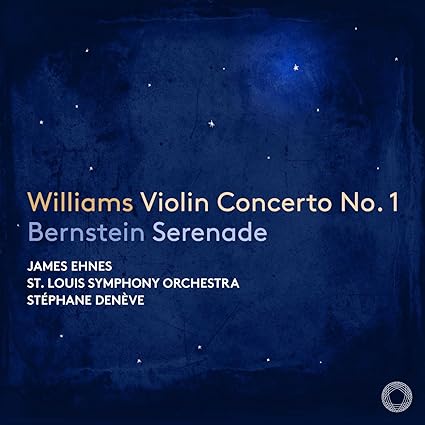

Leonard Bernstein (1918-1990): Serenade after Plato's Symposium John Williams (b. 1932): Violin Concerto No. 1
Most people have come to know and admire the music of John Williams (b. 1932) through the multiple scores he composed for the film industry. I may be mistaken, but I believe he's one of the most prolific and far-reaching movie score writers in the business, with many, many scores for blockbuster movies enjoyed by millions of fans around the world. With 52 Oscar nominations including 5 wins, he is one of the most successful American composers. What most people don't know is that he was composing chamber and orchestral works long before he was ever commissioned to supply the background score to a movie. His Violin Concerto was written in 1974 and predates the 1977 release of the first Star Wars film.
Doing an initial blindfolded audition, never in a million years would anyone guess that this was a John Williams work. Some people might take a stab at William Schuman, Theodore Wiprud or Samuel Barber. Started at the request of his wife, and completed after she passed away, its overall tone is sombre and elegiac. And as I've often observed, the darker viola like hues that Canadian violinist James Ehnes evinces from his instrument, thoroughly match the mood of the music. Broad strokes with minimal orchestral support, as in a contemplative state, make up the first movement whilst a gentle sway and beautifully soaring melodies are at the core of the slow, second movement, marked by orchestral swells of grief and anguish very well defined by the members of the St. Louis Symphony Orchestra, and well captured by the rich and full-bodied Pentatone audio production. Convincingly expressed by Ehnes, it ends on a sigh of repose. A loud, dissonant cry of anger breaks the spell as it launches the final movement, marked by agitated and tense passages on the violin, counterbalanced by sweeping arcs of lyricism in the upper register, again played with fierce resolution and fiery passion by James Ehnes. The concerto ends with blazing bravado. Contrary to his movie scores which require their silver screen action to genuinely come alive, this masterfully crafted concert piece by John Williams stands on its own as a 20th century example of "classical" music.
More than just a filler, the 1954 Serenade by Leonard Bernstein (1918-1990) is another prime example of 20th century American concertante music. Spread over five movements, each one depicting different Greek philosophers contributing to a conversation on life and love. From physical to spiritual the arguments turn around the table, each movement marked by the temperamental identity of each philosopher, be it Socrates or Eryximachus. The highly lyrical and emotive fourth movement Adagio depicting Agathon forms the essence of the work, and again receives Ehnes' steadfastly devout execution which goes straight to the heart of the music. The slight jazzy inflections in the final segment bring everything to a raucous conclusion, as if too much wine had gone around the table. Bravo ...
Anyone who enjoys 20th century music rooted in Americana and/or are particularly fond of the violin, should put aside pre-concieved notions an give this recording their unreserved attention. You'll be blindsided by John Williams' versatility and command of harmonically complex musical structure.
Jean-Yves Duperron - April 2024 Concerto - Second Movement